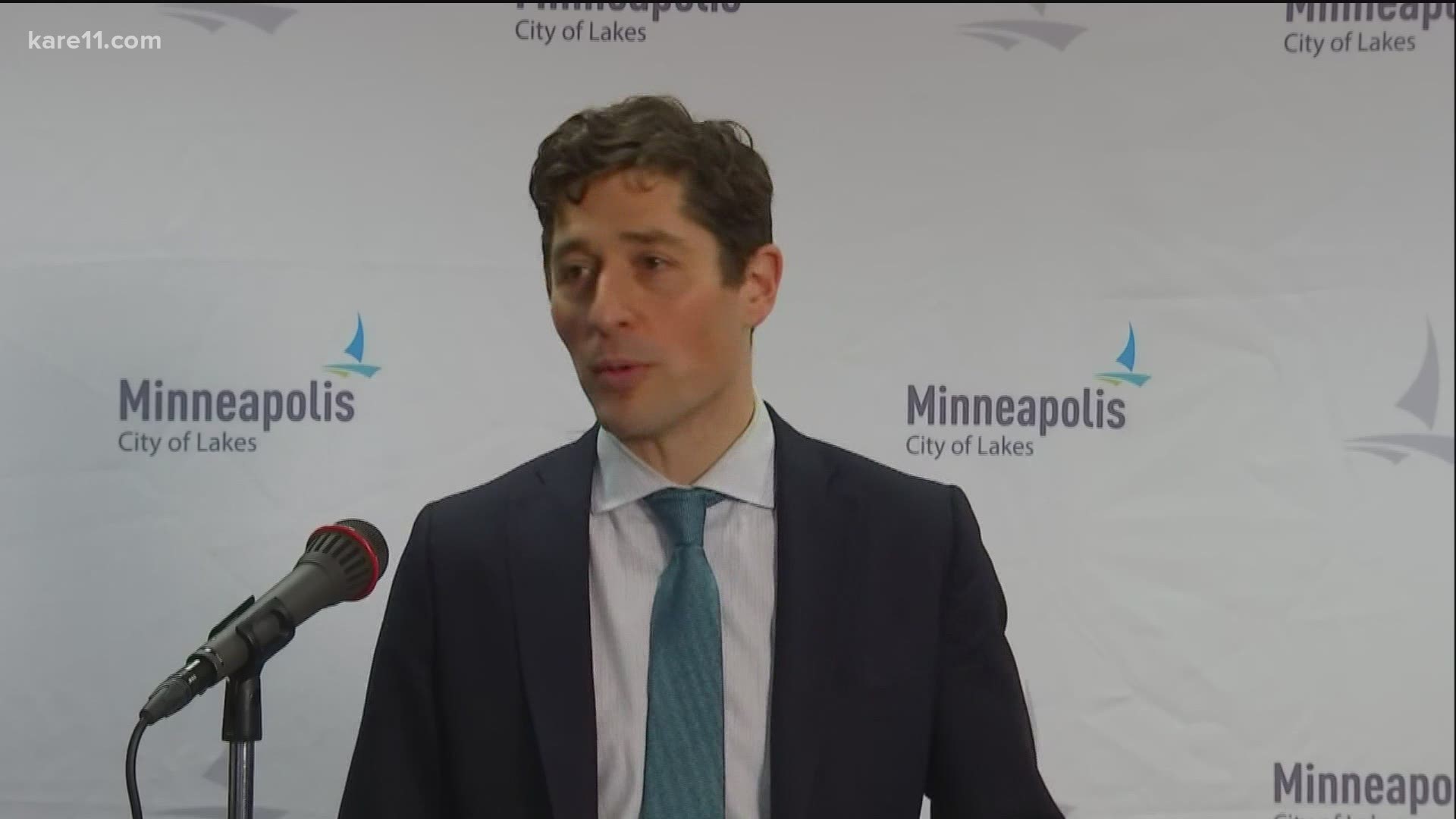MINNEAPOLIS — Note: The video above is from Feb. 17, when city leaders first gave details about security preparations for the trial.
Minneapolis Mayor Jacob Frey and other city leaders shared an update Wednesday morning on security preparations for the high-profile trial of former MPD officer Derek Chauvin, which will take place in downtown Minneapolis.
City updates:
Frey shared news on road closures, protest zones and related preparations.
- On March 1, Sixth Street South (the street and both sidewalks) will be closed between Third and Fourth Avenues next to the Hennepin County Government Center. For now, other streets will remain open.
- Frey said "demonstration zones" will be open north and south of the Hennepin County Government Center, with a "buffer zone" around the center itself. He said he could not give a square footage or head-count prediction during the briefing, but said that information will be available soon.
- Frey reminded residents that the intersection at 38th and Chicago will stay closed to vehicle traffic until the trial's conclusion. Residents of that area will receive a survey in the next week about the neighborhood's future.
- Frey once again mentioned the city's community coordination efforts. According to a Wednesday morning release from the city, the Minneapolis Office of Violence Prevention will fund a "network of community-based groups that can be activated during periods of heightened tension" through the rest of the year, including during the trials.
- He said Minneapolis has one main asset now that it didn't have when unrest began in the wake of Floyd's death last spring - time to plan.
Law enforcement updates:
Deputy Chief of Patrol Erick Fors spoke on law enforcement plans before and during the trial.
- In regards to Minneapolis's main commercial corridors, plans are focused on prevention of property damage, arson and looting.
- "High visibility" patrols of both local police and the Minnesota National Guard are planned, as well as security around "key infrastructure" to keep it operational.
- Ahead of the trial, people downtown may see what Fors called a "small representation" of the National Guard. He said those Guard members are conducting tests ahead of deployment.
- Fors said delays and other changes may well happen, so police are planning to stay "nimble" but are currently moving ahead on the expected timeline.
In a past briefing, DPS Commissioner John Harrington said investigators do not currently have knowledge of groups planning to cause disruption or damage during the trial.
Economy updates:
Director of Economic Policy & Development Erik Hansen spoke about what business leaders in Minneapolis can do to prepare for potential unrest.
- Hansen said business leaders should have a preparedness plan for unrest, and suggested using resources at ready.gov.
- He said businesses "might think" about physical security measures like boarding up windows.
- When asked, Hansen said he isn't necessarily "recommending" businesses board up.
- Business owners who keep sensitive documents inside their businesses are urged to consider moving them to a different physical or electronic location.
You can watch the full briefing below.
This is the second briefing by Frey and other Minneapolis officials about the trial, and regular additional briefings are expected throughout the process. Jury selection for Chauvin's trial is set to begin March 8.
Earlier announcements by city leaders:
In a Feb. 17 press conference, Frey touched on preparations including:
- Stepped-up law enforcement downtown, as the city works with partners from 12 mutual aid jurisdictions/departments. About 1,100 law enforcement officers are expected as the verdict approaches, supported by an estimated 2,000 members of the Minnesota National Guard.
- The intersection at 38th and Chicago will remain closed to vehicle traffic until the trial's conclusion.
- Frey said the mayor's office is working with the city's office of violence prevention and community outreach teams in an effort to communicate.
- Frey and city officials will hold regular briefings in an attempt to increase communication and head off disinformation.
In the Feb. 17 briefing, Frey asked for patience from those who work, live or spend time downtown. He said disruption to both vehicle and mass transit traffic is expected.
You can watch the full Feb. 17 briefing below.
Also on Feb. 17, law enforcement leaders in Minneapolis and surrounding jurisdictions also spoke on on security preparations, introducing "Operation Safety Net".
According to an MPD news release, the operation will "(bring) together local and state law enforcement agencies under a unified command to respond to any civil unrest interrupting peaceful protests during the trial of former Minneapolis Police officer Derek Chauvin."
Gov. Tim Walz has already authorized a National Guard presence in the Twin Cities as the four officers involved in George Floyd's death face trial. He said the authorization was requested by both cities.
“There are some public safety events for which you cannot plan, and there are some for which you can," Walz said in a press release earlier this month. "The upcoming trials of the former officers involved in the death of George Floyd have raised the potential of civil unrest in Minneapolis, Saint Paul, and nearby communities."
The matter of who will foot the bill for security measures surrounding the Chauvin trial has been debated extensively. Earlier this month, Senate Republicans passed a measure that would force the city of Minneapolis to pay for the costs of bringing in other police agencies.
The bill would deduct money from the Local Government Aid payments Minneapolis would normally receive, in order to pay for any mutual aid bills the city doesn't pay on schedule.
MORE INFORMATION: Senate moves to charge Minneapolis for security costs
That passage derailed a planned House vote on legislation to create a special $35 million account, known as the SAFE Fund, that could be accessed by cities to deal with significant events.

